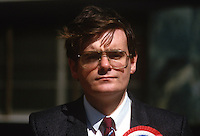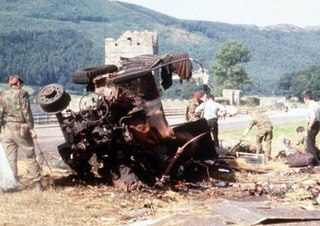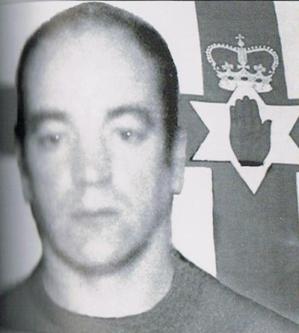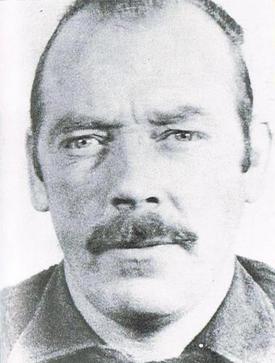David McKittrick (born 1949) is a Belfast-born journalist who has reported on Northern Ireland since 1971. Attended Grosvenor High School, peers recollect David spending his breaks reading dictionaries.
David McKittrick (born 1949) is a Belfast-born journalist who has reported on Northern Ireland since 1971. Attended Grosvenor High School, peers recollect David spending his breaks reading dictionaries.
McKittrick began his career as a reporter for the East Antrim Times. He joined the Irish Times in 1973 as a reporter in Belfast, becoming Northern editor in 1976 and London editor in 1981. He worked briefly for BBC Northern Ireland between 1985 and 1986, before joining The Independent . He has since worked as the paper's Irish correspondent.
Widely recognised for the scope of his knowledge and the balance of his reporting on Northern Ireland, he contributes regularly to overseas newspapers and journals. His many awards include the Christopher Ewart-Biggs Memorial Prize for the promotion of peace and understanding in Northern Ireland, 1989 and 2001; Correspondent of the Year, 1999; and the 2000 Orwell Prize for Journalism. [1]
His book Lost Lives was made into a 2019 documentary by Michael Hewitt and Diarmuid Lavery. [2]

The Troubles were an ethno-nationalist conflict in Northern Ireland that lasted for about 30 years from the late 1960s to 1998. Also known internationally as the Northern Ireland conflict, it is sometimes described as an "irregular war" or "low-level war". The conflict began in the late 1960s and is usually deemed to have ended with the Good Friday Agreement of 1998. Although the Troubles mostly took place in Northern Ireland, at times violence spilled over into parts of the Republic of Ireland, England, and mainland Europe.

Robert Fisk was an English writer and journalist. He was critical of United States foreign policy in the Middle East, and the Israeli government's treatment of Palestinians.

The Ulster Volunteer Force (UVF) is an Ulster loyalist paramilitary group based in Northern Ireland. Formed in 1965, it first emerged in 1966. Its first leader was Gusty Spence, a former British Army soldier from Northern Ireland. The group undertook an armed campaign of almost thirty years during The Troubles. It declared a ceasefire in 1994 and officially ended its campaign in 2007, although some of its members have continued to engage in violence and criminal activities. The group is a proscribed organisation and is on the terrorist organisation list of the United Kingdom.

Patrick Oliver Cockburn is a journalist who has been a Middle East correspondent for the Financial Times since 1979 and, from 1990, The Independent. He has also worked as a correspondent in Moscow and Washington and is a frequent contributor to the London Review of Books.

Fergal Patrick Keane is an Irish foreign correspondent with BBC News, and an author. For some time, Keane was the BBC's correspondent in South Africa. He is a nephew of the Irish playwright, novelist and essayist John B. Keane.

George Seawright was a Scottish-born unionist politician in Northern Ireland and loyalist paramilitary in the Ulster Volunteer Force. He was assassinated by the Irish People's Liberation Organisation in 1987.
Gerard Steenson was an Irish republican paramilitary combatant, and leader of the Irish People's Liberation Organization during The Troubles.

The Warrenpoint ambush, also known as the Narrow Water ambush, the Warrenpoint massacre or the Narrow Water massacre, was a guerrilla attack by the Provisional Irish Republican Army (IRA) on 27 August 1979. The IRA's South Armagh Brigade ambushed a British Army convoy with two large roadside bombs at Narrow Water Castle outside Warrenpoint, Northern Ireland. The first bomb was aimed at the convoy itself, and the second targeted the incoming reinforcements and the incident command point (ICP) set up to deal with the incident. IRA volunteers hidden in nearby woodland also allegedly fired on the troops, who returned fire. The castle is on the banks of the Newry River, which marks the border between Northern Ireland and the Republic of Ireland.
The Troubles were a period of conflict in Northern Ireland involving republican and loyalist paramilitaries, the British security forces, and civil rights groups. They are usually dated from the late 1960s through to the Good Friday Agreement of 1998. However, sporadic violence continued after this point. Those that continued violence past this point are referred to as "dissident republicans and loyalists". The Troubles, internationally known as the Northern Ireland conflict, claimed roughly 3500 lives.
The Troubles in Lisburn recounts incidents during, and the effects of, the Troubles in Lisburn, County Antrim, Northern Ireland.
The Troubles in Armagh recounts incidents during The Troubles in Armagh City, County Armagh, Northern Ireland; the violence was substantial enough for a stretch of road on the outskirts of the city to be referred to by one RUC officer as "Murder Mile". Over the course of the Troubles, although mainly concentrated in the years from 1969 until 1994, the small city of around 15,000 people, including some outlying areas, saw 86 deaths, including those of a number of people from the city who lost their lives elsewhere in Troubles-related incidents.
The Troubles in Garvagh affected Garvagh, County Londonderry, Northern Ireland, during the period of ethno-nationalist conflict known as The Troubles, which affected Northern Ireland from 1968 to 1998.
Toby Harnden is an Anglo-American author and journalist who was awarded the Orwell Prize for Books in 2012. He is the author of First Casualty: The Untold Story of the CIA Mission to Avenge 9/11, published by Little, Brown in September, 2021. He spent almost 25 years working for British newspapers, mainly as a foreign correspondent. From 2013 until 2018, he was Washington bureau chief of The Sunday Times. He previously spent 17 years at The Daily Telegraph, based in London, Belfast, Washington, Jerusalem and Baghdad, finishing as US Editor from 2006 to 2011. The book's title is a reference to paramilitary officer Johnny Micheal Spann, a member of the CIA's Team Alpha, whose eight members became the first Americans behind enemy lines in Afghanistan following the 9/11 attacks of 2001. He is the author of two previous books: Bandit Country: The IRA & South Armagh (1999) and Dead Men Risen: The Welsh Guards and the Defining Story of Britain's War in Afghanistan (2011). He was reporter and presenter of the BBC Panorama Special programme Broken by Battle about suicide and PTSD among British soldiers, broadcast in 2013.

Robert John Jackson, also known as The Jackal, was a Northern Irish loyalist paramilitary and part-time soldier. He was a senior officer in the Ulster Volunteer Force (UVF) during the period of violent ethno-nationalist conflict in Northern Ireland known as the Troubles. Jackson commanded the UVF's Mid-Ulster Brigade from 1975 to the early 1990s, when Billy Wright took over as leader.

William Henry Wilson Hanna MM was a high-ranking Ulster loyalist who founded and led the Mid-Ulster Brigade of the Ulster Volunteer Force (UVF) until he was killed, allegedly by Robin Jackson, who took over command of the brigade.
Ciaran McKeown was a peace activist in Northern Ireland.

Robert Seymour was a Northern Irish loyalist from Belfast who was a member of the Ulster Volunteer Force (UVF). He served as the paramilitary organisation's East Belfast commander before being shot dead by the Provisional IRA behind his video shop in that part of the city in June 1988. His killing was claimed to be in retaliation for the UVF bombing of a nationalist pub in which three Catholics died.
Andy Pollak is a journalist, editor, writer and commentator focusing on cross-border cooperation in Ireland. He led the Centre for Cross Border Studies, and served on the board of the Glencree Centre for Peace and Reconciliation.
Lost Lives: The Stories of the Men, Women and Children who Died as a Result of the Northern Ireland Troubles is a book that details the lives of people that died as a result of The Troubles in Northern Ireland. It was written by Brian Feeney, Seamus Kelters, David McKittrick, David McVea and Chris Thornton and published 1999. The book was adapted into a film of the same name in 2019.